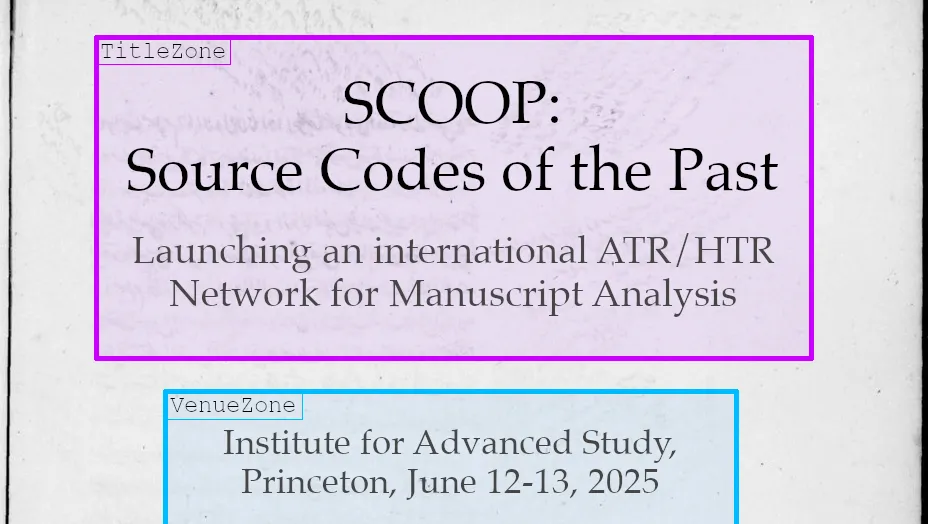SCOOP: Source Codes of the Past: Launching an international ATR/HTR Network for Manuscript Analysis
–
Speakers

Image: Adapted from Princeton Islamic Manuscripts, Garrett no. 3219Y, fol. 9b.
This workshop is by invitation only. For more information, please get in touch with croughan@princeton.edu, hreimitz@princeton.edu, or lucia.waldschuetz@princeton.edu.
Organized by:
- Institute for Advanced Study (IAS), Princeton
- Center for Digital Humanities (CDH), Princeton University
- Manuscripts, Rare Books, and Archival Studies (MARBAS), Princeton University
- Humanities Initiative, Princeton University
- Digital Lab, Institute for Medieval Research (IMAFO), Austrian Academy of Sciences
While recent years have seen many significant developments in ATR/HTR (automatic text recognition, handwritten text recognition), there remains work to be done when adapting these technologies for different scripts, textual traditions, and manuscript structures – and especially so for low-resource languages and materials. Additionally, the integrations of ATR with dataset curation, text re-use analysis, editorial workflow automation, and other methodologies are transforming the way researchers engage with manuscript sources. This workshop will bring together humanities/social science scholars, software engineers, and machine learning researchers so that technological and humanistic expertise might mutually inform one another. The workshop will also lay the groundwork and define the agenda for a second SCOOP exchange meeting in Vienna in the summer of 2026, to be hosted by the Austrian Academy of Sciences and the University of Vienna.
Sponsored by:
- Center for Collaborative History, Princeton University
- Department of Classics, Princeton University
- Seeger Center for Hellenic Studies, Princeton University, with the support of the Stanley J. Seeger Hellenic Fund
- Program in Medieval Studies, Princeton University
- Committee for the Study of Late Antiquity, Princeton University
Program Schedule
| Thursday, June 12th | |
|---|---|
9:15 - 10:30 |
Session 1a: HTR Technology Development Moderator: Martin Roček (Charles University, Prague, Institute for Medieval Research, Austrian Academy of Sciences, Vienna)
|
10:45-12:00 |
Session 1b: HTR Technology Development Moderator: Martin Roček (Charles University, Prague, Institute for Medieval Research, Austrian Academy of Sciences, Vienna)
|
1:00-2:30 |
Session 2: Document or Handwriting Classification Moderator: Tobias Hodel (University of Bern)
|
2:45-4:30 |
Session 3: HTR Methodological Challenges Moderator: Christine Roughan (Princeton University)
|
4:45-6:15 |
Session 4: Language Challenges Moderator: Anna Michalcová (Charles University Prague, Czech Language Institute at the Czech Academy of Sciences, Institute for Medieval Research, Austrian Academy of Sciences, Vienna)
|
| Friday, June 13th | |
|---|---|
9:00-10:45 |
Session 5: Datasets and Institutions Moderator: Jan Odstrčilík (Institute for Medieval Research, Austrian Academy of Sciences, Vienna)
|
11:00-12:30 |
Session 6: Leveraging Outputs: Text Reuse, NLP, and more Moderator: Tim Geelhaar (Goethe University Frankfurt)
|
2:00-3:30 |
Plenary Discussion: Future of HTR |
4:00-5:30 |
Organizational session; planning for the 2026 meeting |